The second season of Hazbin Hotel delivered a musical marriage so unexpected, it could only exist in the Hellaverse: the pairing of Broadway powerhouse Jessica Vosk (Lute) and pop-punk icon Patrick Stump (Abel), the lead vocalist of Fall Out Boy. Tasked with blending these two very different musical worlds were Sam Haft and Andrew Underberg, the brilliant musical composers behind Hazbin Hotel. Securing Stump for Abel was a monumental—and shocking—win for the scope of the entire second season. Haft and the team knew the character’s execution had to be perfect and that the music written for Abel was a respectful, full-throated homage to Stump’s decades-long iconic career.
Videos by ComicBook.com
In an exclusive interview, Sam Haft detailed the “daunting” process of writing Abel’s standout moments, ensuring they were “Fall Out Boy-esque” enough to sit comfortably next to the band’s discography while remaining faithful to the show’s dark, theatrical themes.
Haft also dove deep into the hidden musical Easter eggs, the shared DNA between emo music and musical theater, and the subtle, character-driven reasons behind every detail, from the harmonies of Alex Brightman’s not-so-dearly-departed Adam to Abel’s first-ever on-screen expletive.
Landing Patrick Stump as Abel Was a Delightful Surprise
Casting Patrick Stump as Abel, the son of the late, not-so-great Adam, was a massive addition for Hazbin Hotel Season Two. For musical composer Sam Haft, it was the realization of a perfect-world scenario, the kind of dream casting that rarely comes to fruition in animated production. Haft explained that while roles are often initially created with a specific, dream actor in mind, the reality of landing them is slim.
“There are times where these roles will get written and sort of patterned after, like, ‘Oh, in a perfect world, we get this person.’ But almost never do you get that person in the role,” Haft said. “And Hazbin has been lucky enough to get that person over and over and over again. And Patrick Stump is one great example of that.”
However, the excitement of snagging a singer with Stump’s iconic voice and musical legacy was quickly followed by a heavy sense of professional responsibility, especially as Haft crafted a duet that would feature Stump alongside one of Broadway’s biggest stars, Jessica Vosk, in a reprise of the song “Gravity” within the larger song, “When I Think About the Future.” This unlikely pairing was a challenge, and it made the writing “When I Think About the Future” an extremely “daunting” task.
“We wanted to really do justice to the fact that this is Patrick Stump,” Haft stressed. The music had to honor his place in musical pop culture, specifically giving him something that felt “Fall Out Boy-esque.” The ultimate measurement of success, Haft knew, would be the fan reactions. He and Underberg needed to create a song that was so authentic to Stump’s signature sound that Fall Out Boy fans would also find it true to the essence of the band and Stump’s vocals.
“We wanted something that could feel like it belonged in the same world as Hazbin,” Haft said. “That you could listen to alongside a Fall Out Boy album.”
The overwhelmingly positive reception was a benchmark of their success. Haft has seen countless comments from fans asking if Stump himself co-wrote the section or if Fall Out Boy recorded the guitars or drums—a tribute to the meticulous attention to detail Haft and Underberg paid to the essence of the band while still making it feel like a true part of the Hazbin Hotel world. Haft confirmed that Stump’s parts were crafted as “a lot of intentional, very detail-oriented homage.” That dedication paid off, with both the “Gravity” reprise duet with Vosk and Abel’s solo moment in “Hear My Hope” taking over social media by storm, instantly capturing fans with the genuine Fall Out Boy sound that blended perfectly into the overall Hellaverse.
Fall Out Boy’s Pop-Punk Sound Shares DNA With Musical Theater

The smooth blend of a pop-punk sound with the Broadway world of Hazbin Hotel is not an accident; it is a testament to the theatrical nature of Fall Out Boy’s music itself. Haft drew a direct line between the band’s aesthetic and the sensibilities of musical theater, astutely noting a shared “DNA” between the emo world and the stage.
“I think that also speaks to Fall Out Boy, too, because as a band, they are so theatrical,” Haft said. He recalled growing up listening to their music and being “so impressed by the amount of storytelling they would put into musical numbers.” This lyrical and dramatic nature of Fall Out Boy’s catalog, Haft suggested, meant the band’s sound wasn’t all that different from the theatrical realm. “Fall Out Boy is pop punk emo for theater kids, I would say,” he noted, a sentiment that surely resonates with the elder millennial audience.
This shared foundation between Fall Out Boy’s established sound and Broadway numbers makes perfect sense when considering Patrick Stump’s raw talent. Haft pointed out that beneath the pop-punk exterior, Stump has the technical skills of a Broadway veteran.
“Patrick Stump is a terrific, very technical tenor with a beautiful vibrato,” Haft said. “And so he really—if he ever had ambitions to be on Broadway—he could do it in an instant.” This technical mastery meant Haft could write for Stump with the same high expectations he would for the rest of the seasoned Broadway cast of Hazbin (including Jeremy Jordan, Alex Brightman, Erika Henningson, and many more Broadway veterans), knowing Stump had the range and control to not only execute, but excel with, the dramatic demands of the Hellaverse.
Abel’s Moment of Bravery Came From an Echo of His Father

One of the most powerful and dramatic moments in “Hear My Hope” is the very subtle yet crucial harmonies between Abel and Adam (Alex Brightman) during Abel’s solo moment, where he steps up as a leader. As Abel finally stands up to an insubordinate Lute, Haft introduced Adam’s recognizable harmonies softly in the background. This artistic choice was not merely a musical flourish or reference to father and son; it was a deep dive into Abel’s desperate attempt to embody his dad’s leadership skills and Lute’s damaged mind that has been unraveling throughout the season.
Haft explained that in this scene, Abel is not suddenly becoming his best self; he is desperately trying to become his “most Adam self” to meet the severity of the situation. It’s a moment of “proverbially nutting up,” where Abel realizes he doesn’t know how to step up on his own without channeling the larger-than-life figure he viewed his father as, despite Adam’s deep dislike for his own son.
“It’s clear that Abel really has this sense of his father as this hero of heaven, as this larger than life figure,” Haft said. Abel is doing his best to summon “all the Adam that exists in his little cinnamon roll body.”
The purpose of bringing in Brightman’s voice as Adam was two-fold. Firstly, it shows Abel’s internal struggle and severe anxiety to embody his father’s aggression. Secondly, and more critically, it illustrates the way Lute experiences the moment. As seen earlier in the series, Lute is in a state of “teetering on madness” and hallucinating her own version of Adam.
“This idea that Abel is really, is he being Adam? No, he’s not. But he’s embodying [Adam] just enough that what he’s doing in real life and how Lute is perceiving the world and perceiving her sort of phantom Adam can intersect for one brief moment and and stop her in her tracks,” Haft explained. Abel’s use of Adam confidence, body language, and the imposing image of his helmet (that is similar, though not the same as Adam’s) are just enough to trick Lute’s “poisoned mind” into seeing Adam, which allows the phantom Adam to fully appear and pause her rampage to follow orders like the soldier she is.
This intense psychological moment is underscored by a genius, blink-and-you’ll-miss-it musical Easter egg that Haft was shocked someone caught so quickly. As Abel begins to embody Adam and Brightman joins the harmonies, his section begins with the line, “Let me stop you right there.” This is the very first line of Adam’s famous song from Season 1, “Hell is Forever,” cementing the idea that Abel has stepped into his father’s role, if only for a brief, desperate moment of leadership.
Even Angels as Pure as Abel Swear (For Very Specific Reasons)

Haft and the creative team are deeply deliberate about how different characters in the Hellaverse use profanity, treating it as a key tool for characterization rather than just casual throwaway dialogue for sinners in Hell. For a character like Vox, swearing is part of his regular vernacular and not even used as a curse word in the traditional sense; Haft explained that Vox “swears like he speaks,” using expletives as a standard form of very aggressive communication rather than for emphasis. Adam, in contrast, swore differently, using profanity “boorishly” in a “bro-y and misogynist kind of way” that reflected his generally toxic behavior. Charlie’s relationship with swearing is more reserved, as she only uses curse words occasionally and specifically for emphasis, meaning she is “not casually throwing swears into conversation,” which fits the Princess of Hell.
Similarly, Abel only swears twice, both of which are in the finale. This was a highly intentional choice for Abel that stemmed purely “out of fear.” When he curses during his confrontation with Hell, it is not an aggressive act but rather an anxious, almost involuntary response—the result of being pushed to a point of “mental breakdown” or nervousness.
This meticulous attention to the specific set of circumstances that lead a character to swear even extends to the angels. Haft highlighted the subtle humor of Emily repeating “Holy shit” when the gates of Heaven fall, only to immediately cover her mouth, suggesting that this brief, context-driven slip may have been the very first curse word the very sweet and pure angel ever said.
Ultimately, Haft and the Hazbin Hotel team’s success in weaving Patrick Stump’s iconic voice into the Hellaverse lies in these multiple levels of brilliantly planned details and not just stunt casting. They managed to create spectacular pieces of music that satisfied Fall Out Boy fans with its pop-punk authenticity, advanced the dramatic stakes of the plot with psychological nuance, and upheld the show’s rigid, character-specific approach to every element, down to a single four-letter word.
What do you think of Patrick Stump as Abel? Leave a comment below and join the conversation now in the ComicBook Forum!










